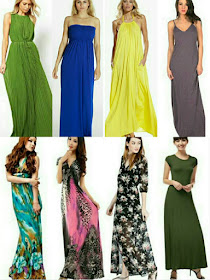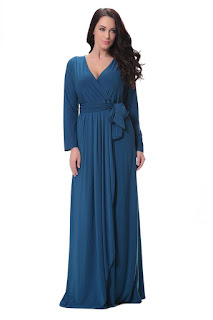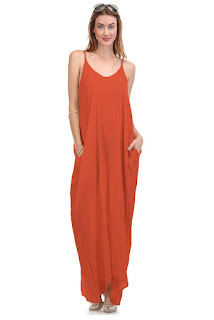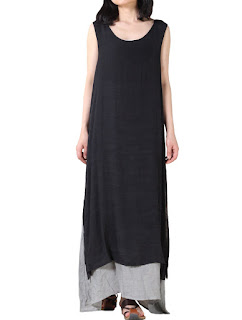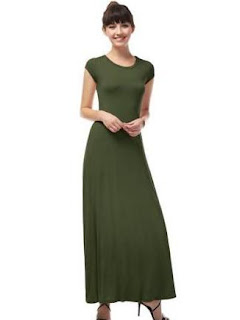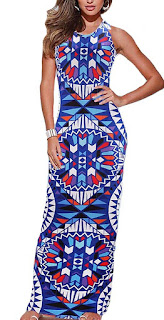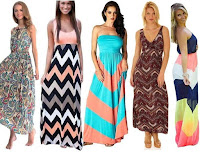Maxi dresses fall in different categories, with most fitting
in more than one class. Though hemlines are diverse, all of them have one thing
in common, they are long. The shortest dress that may be defined as a maxi
dress is one that hits a few inches above the ankles.
Though Maxi dresses hardly show any part of the legs, they are very fashionable. Many women consider them the most versatile dresses because they can be dressed up or down to fit various events and seasons.
Below, you’ll find the various types of maxi dresses.
Strapless Maxi Dresses
A Strapless Maxi Dress has no sleeves and
no kind of fastening on or around the shoulders. To avoid falling, theses types
of dresses are usually fastened just above the bust. The dress might be cinched
at the waist, or free flowing.
The area around the natural waist may also be tightened with
a zipper, buttons or drawstring tie to keep the dress up. It therefore supports
itself like a corset. Other varieties feature a built-in bra that doubles-up as
bust support and also keeps the dress from falling.
Halter Neck/Halter Top
A Halter Neck Maxi Dress is like a
strapless dress but comes with a strap which is sewn onto the chest area and
goes all the way to the back of the neck. The strap may be a single pullover,
or two separate ones that the wearer wraps around the neck and joins them with
a snap or button at the nape. When wearing this kind of dress, a substantial
part of your back will be left exposed.
Off-Shoulder
An Off-Shoulder Maxi Dress has no straps or
fastening on the shoulders. It differs from a strapless gown in that it mainly
passes above the arms. Some styles will reach to below the armpits. But they
must have sleeves of whichever kind to be defined as off-shoulder.
Backless Maxi Dresses
There are so many styles of Backless Maxi Dresses. Any
dress which shows some part of the back is considered to be backless. However,
there is debate on whether some dresses with plunging V or U-back are backless,
low-back, or normal outfits.
V-Neck Style
V-Neck Maxi Dresses have 2 lines which
drop from the shoulders and connect at the centre of the chest. The V may end
above the bust, or below it, or lower. The two dropping lines may originate
from near the neck, or further away. Some styles will also have a V-back.
Plunge/Front plunge
Plunge Maxi Dresses feature a dropped
neckline in styles like deep V, deep U or a low square. The plunge is usually
at the front but some outfits will also have the same shape at the back. These
dresses are meant to show some part of the cleavage, or a contrasting piece
like a camisole. The plunging lines usually meet between the breasts, but
sometimes as low as the waist.
Spaghetti Straps
Spaghetti Maxi Dresses are designed like a camisole or tank top but feature very thin
shoulder straps. Some of the straps are adjustable, while others are separate
and have to be tied together. These outfits are popular in evenings and
parties.
Tank Styles
A Tank Maxi Dress
is designed like a vest or tank top, hence the name. The neckline and armholes
can be minimal or plunging. They are ideal for warm weather.
The waistline of Low-Waist Maxi Dresses falls way below
the navel and somewhere around the waistband of low waisted underwear. This
style creates a lengthening effect, as it seems produce a sense of balance
between the lower and upper parts of the body.
Waistlines of High-Waist Maxi Dresses can be as low as
barely showing the belly button, or as high as up to 3 inches above it. This
type of gown is popular among women with big bellies. A simple belt or
drawstring tie cinches the waist to create a more balanced look.
Empire Waist
The waist of an Empire Waist Maxi Dress is positioned just
below the bust and enhanced with elastic, drawstring or some kind of a
waistband. The bodice is usually fitted, save for bust accommodation. The skirt
is typically gathered at the waist and flows all the way to the ankles. The aim
of this fashion is to draw attention to the bust and away from the midsection.
The main point of styling a Maxi Dress with No Waist is to
create a long streamlined effect. The fabric flows from the shoulders in an
A-line format without cinching at the waist. Just like a button shirt, a tent
maxi dress bridges the gaps between the bust and the tummy. This seams to
conceal the protrusions and therefore for a flattering effect. Some gowns
feature Princess Seams to enable
some shaping around the curves.
A Long Sleeved Maxi Dress must have sleeves
that cover the entire arms up to the wrists. This style is very popular in the
cold seasons like winter. To add some style, cold shoulder long sleeves have
some garment cut off to leave the shoulder exposed. Sheer or mesh fabrics are
used to create sleeves that make the dress look more appropriate for summer.
Short Sleeve Maxi Dresses have sleeves
that extend to above the elbows. The term is used to mean longer than cap
sleeve and shorter than ¾ sleeve. Short sleeves must cover, or seem to cover,
the armpit for them to be differentiated from cap sleeves. Puff Sleeves are short sleeves which are gathered at the end and
sometimes even at the beginning.
A Sleeveless Maxi Dress is just like a
normal dress with the sleeves cut off. It is different from a tank maxi dress
in that it has ordinary shoulders and not styled straps. If the shoulders are
shaped in certain ways, it may be difficult to categorize it either as a tank
or sleeveless.
¾ Sleeve Maxi Dresses have sleeves that
end somewhere between the wrist and the elbow. They are ideal for ladies who
like long sleeves but don’t love clothes with garments around the wrists.
Cap sleeves
A Cap Sleeve Maxi Dress has a small piece
of fabric covering only just the shoulders but leaving the armpits exposed. It
looks rather like a sleeveless dress but with the shoulders and extended and
slightly bent.
Pencil Maxi Dresses are form-fitting from
the shoulders to the hem. To ease walking, they may be stretchy, pleated, slit
at the back or sides. They are not suitable for summer weather as they offer
little ventilation. Most ladies love them when going to windy areas as they do
not flow with the wind.
Fit & Flare Maxi Dresses are flowy
with a fitted bodice. This style borrows heavily from A-line skirts. However,
these dresses are wider at the hem. Circular designs are narrower at the hips,
while gathered ones have a wider mid-section to conceal thick hips and thighs. Mermaid Maxi Dresses flare from the
knees down.
Maxi Dresses With Slits
Slit Maxi Dresses are designed to ease
movement in a pencil outfit, increase ventilation or provide a sexy glance of
leg. Slits are cut from the hem to the knees, or higher towards the natural
waist.
Different types and sizes of pleats are used to engineer a
voluminous gown into a more fitted silhouette. The bodice is normally fitted
and the pleats are added to the skirt. The point of making Pleated Maxi Dresses is to
ease movement or to achieve a particular outcome, while hiding the volume.
Though these dresses look great on all body shapes, they are not popular as
they look more conservative than fashionable.
Crinkle Maxi Dresses
have very small creases that can not be classified as pleats. Unlike pleats,
their purpose is not to hide volume but rather to produce a certain look.
Dresses are crinkled on the whole length, the skirt only, or just on the
bodice.
Wrap Maxi Dresses have a front closure
with a wide overlap, just like a dressing gown. The fastening is done by one
button, and sometimes several. If the overlap is wide enough, a drawstring tie
may be used. The result is a V-shaped neckline and a figure-hugging but flowy
outfit. They are perfect for casual wear.
Also sometimes called a shirtdress, a Button-Up Maxi Dress is
designed like a man’s shirt. They have different necklines and not all have
collars. Some come with an attached belt while others have no waist. Buttons
start at the chest, or below the bust, and end at the knees.
Solid Color Maxi Dresses are made of a
single color, usually dark, to form a basis for adding colors. The main
advantage of these simple & neutral colors is that they pair easily with
most outfits, shoes and other accessories. They are also at times available in
striking colors like white, yellow and orange.
Prints
Printed Maxi Dresses range from simple to
intricate prints. Patterns can mimic animals, art, floral prints, images,
flowers, drawings etc. In today’s world, digital textile printing has enabled
designers to use their craziest ideas to print garments with maximum ease.
Striped Maxi Dresses feature lines of
differing widths in a color different from the background color. These stripes
can run vertically, horizontally, diagonally, or mixed in complex patterns. The
lines may be of many colors, with the possibility of hiding the background
color. If the stripes cross, the item is known as checked.
Sheer Maxi Dresses are worn for style
rather than coverage. They are normally mini/midi dresses disguised as maxis
with a translucent long skirt over a shorter one attached on the waistband. The
outer one is made of mesh, lace or netting fabric whose job is to style rather
than cover the one underneath. The inner layer may also be maxi length.
Some sheer maxi dresses are not lined. They are designed to
reveal your skirt, dress or even underwear. Some girls wear them over miniskirts
or leggings and a crop top to unleash the mid-section. You can wear them over a
mini or midi skirt of your choice, or use as beach cover-up.
Semi Sheer Maxi
Dresses are made to show the silhouette of your legs.
Stretch Maxi Dresses are made of fabric
which is blended with elastic material for figure hugging elegance. The whole
dress may be stretchy, but some are made of a stretchy bodice and a flowy
skirt. Lovers of these gowns say they are comfy and relaxed.
Unlike sheer, Lace Maxi Dresses are lined all the way
to the hem. They are sewn from matching or contrasting fabrics with the outer
one in an elegant lace detail. Other features like embellishments may be added
to nice up the lace.
Though lace maxi dresses are meant to be opaque, some end up
being see-through due to the transparency of the outer layer. It’s not uncommon
to find a lace gown with an unlined bodice.
Denim Maxi Dresses are well liked because
they do not go with the wind and don’t require layering underneath. The most
popular styles are A-line tank or sleeveless. Trendy details include front
buttons, side slits, raw hem and drawstring waist. Skater styles are not
admired because they would be too heavy.
Combo Maxi Dresses are made of different
fabrics or colors for the bodice and skirt. For instance, a dress with a
chiffon bodice may have a cotton skirt. Another example is a gown with a white
top and a black bottom. This creates the illusion of a crop top and a
high-waisted skirt. Some color combos feature a print bodice and solid skirt,
or vice versa.
High-Low Maxi Dresses
These are maxi length dresses with part of the hem (mostly
at the front or side) cropped to mid-calf or below knee. Some people don’t
consider High-Low Maxi Dresses as
maxis. Another style of high low is whereby a midi dress is layered with a maxi
length material attached at the back of the waistline and flows to the ankles.
Tiered Maxi Dresses
are made of tiered layers sewn horizontally to add volume and style. The layers
are mostly of the same material. Despite being voluminous, they can be made of
light-weight fabric to be incredibly light. The tiers start from the waist and
run downwards but ruffles may be added at the bust to create uniformity.
If you believe there are more types of maxi dresses that are
not included in this list, feel free to speak out in the comment section. It
will be our pleasure to add them.
You May Also Like:
How to Wear a Maxi Dress
Find styling tips to guide you in looking great in a maxi dress from how to wear the right style for your shape to how to accessorize your long gown
Get facts on what a maxi dress is, how it should fit, who you should wear it and why. Also learn the different maxi dress styles suited for diverse body types and events
You May Also Like:
How to Wear a Maxi Dress
